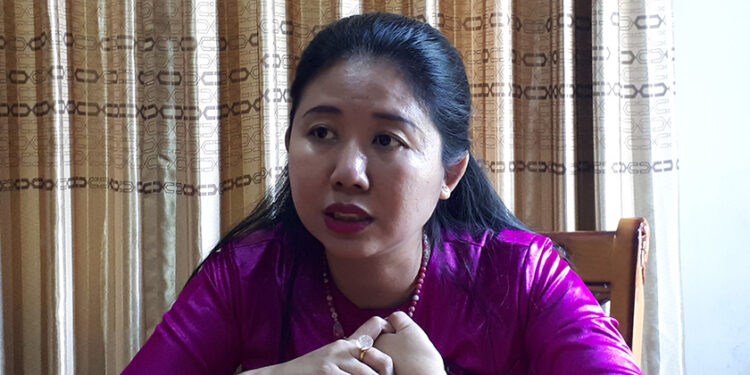YANGON — As chair of Mon State Parliament’s Women’s and Children’s Rights Committee, Daw Khaing Khaing Leh is dedicated to protecting the region’s youth and female constituents.
In the first seven months of this year, her committee has received more than 40 complaints of sexual violence against females, including the alleged rape of minors. While investigating sexual assault cases and working to bring the perpetrators to justice, the 38-year-old lawmaker has also been promoting the rule of law.
A former lawyer, Daw Khaing Khaing Leh was elected to the state Parliament to represent Thaton Township for the National League for Democracy in the 2015 general elections, becoming one of six female lawmakers in the 31-seat legislature.
She has urged the state government to take steps to ensure security and the rule of law and tried to promote good relations between the executive and legislative branches. She also chairs the Parliament’s Bill Committee.
Daw Khaing Khaing Leh spoke recently with The Irrawaddy at the Parliament in Mawlamyine about the difficulties local lawmakers are facing to implement reforms and how much progress they have made since the general elections.
Lawmakers raise problems affecting the public and the needs of their constituents in parliament. How satisfied are you with how they are being solved or improved?
When we look at whether the government has kept all the promises it made to Parliament in response to lawmakers’ questions and proposals, it hasn’t. I am saying this because a report by a parliamentary committee on the government’s guarantees, pledges and undertakings said the government only implements about 30 percent of its promises. Some are still in the works, some have been implemented and others are pending.
Another thing is state development. Mon State has been receiving a larger budget, so we have been able to work on improving municipal services and road transportation in the state over the past three years. But in our state we do not yet have full electricity coverage in Ye Township and in rural areas while we are generating electricity for other states and regions.
What do you think of the government’s failure to fulfill most of its promises?
There are two points. One is that when it is easy to take action on lawmakers’ questions or proposals, the government does. Like asking it to build roads or bridges. It’s easy to implement that because it just puts the requests in the budget proposals. But when it comes to issues like squatting and illegal land use, there are some delays in government action. But those are the things lawmakers often raise. In cases of confiscated land, it needs to be solved according to the policies of the Union government’s Committee for Scrutinizing Confiscated Farmland and Other Land. It has difficulty acting on cases where the state government doesn’t have authority and needs to collaborate with the Union government.
But some say work is not being done because government departments drag their feet and because there is too much red tape.
Yes, there is that too. When [the state] Parliament writes to the state government, it takes days to hear back. Even sending information between the chief minister’s office and another minister’s office in the same building takes a long time. Then directives will be issued to other departments after that. We need to find ways to make those steps quick. We are developing an e-government system. But I think it will be a long time yet before implementation. Before then, we need to eliminate some unnecessary steps in the paperwork to be effective at providing public services.
What do you think the [state] government should prioritize in the remaining two years of its term?
There are no priorities. Everything should be done simultaneously. Every government focuses on infrastructure developments such as building bridges, constructing roads and providing electricity and water, which are important in fulfilling the basic needs of the public. But while we are working on infrastructure, ensuring the rule of law is also important. People would be satisfied with improvements in meeting their basic needs, but they hope to live having equal rights and justice. Only by strengthening the rule of law will peace and development be sustainable.








